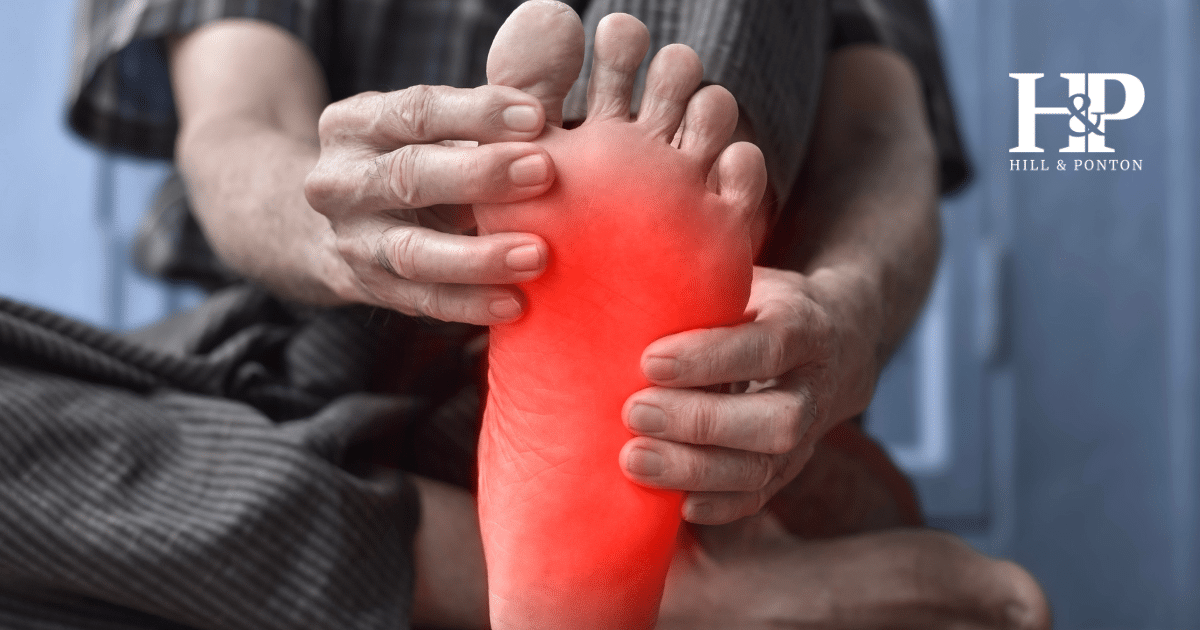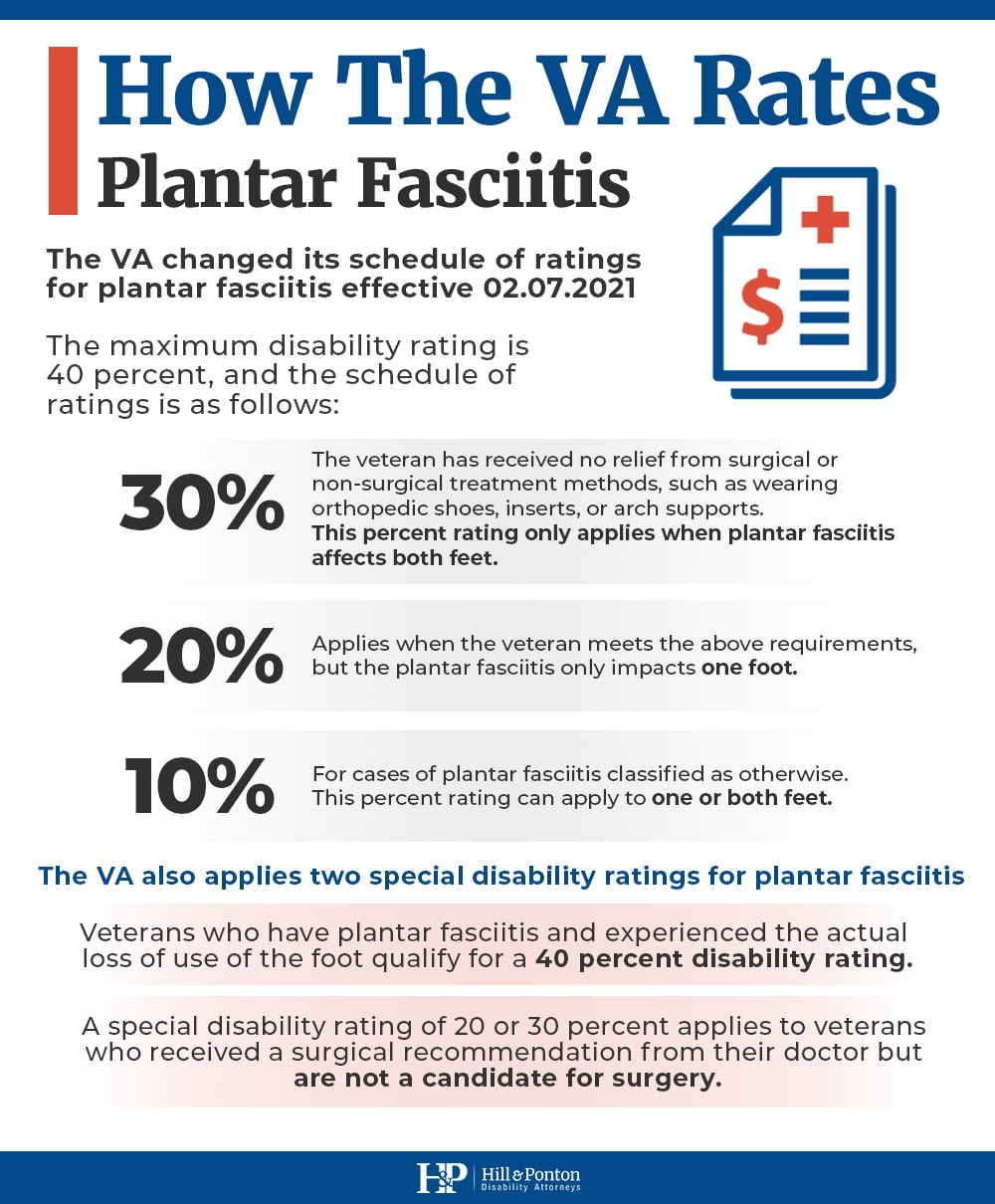Plantar fasciitis is a painful condition that affects the fascia—a thick band of tissue—on the sole of the foot. This condition is sometimes referred to as runner’s heel, painful sole syndrome, or neuritis. Veterans experiencing plantar fasciitis may be eligible for service-connected disability compensation if they can establish a link between their condition and military service.
How the VA Rates Plantar Fasciitis
Under diagnostic code 5269, plantar fasciitis is assigned VA disability ratings of 10%, 20% and 30%, or the maximum 40% rating for loss of use of the foot.
VA Ratings for Plantar Fasciitis
- 40%: Reserved for veterans who have experienced loss of use of the foot due to plantar fasciitis.
- 30%: This bilateral rating applies when plantar fasciitis affects both feet and does not respond to either surgical or non-surgical treatment methods, such as orthopedic shoes, inserts, or arch supports; it is also given to veterans with plantar fasciitis in both feet who were recommended for surgery but are not candidates for the procedure.
- 20%: This rating applies when plantar fasciitis impacts one foot with no relief from both non-surgical and surgical treatment; it is also given when surgery was recommended but the veteran is not a candidate for the procedure.
- 10%: Assigned for cases of plantar fasciitis which does not require surgery or non-surgical treatment, regardless of whether it’s unilateral or bilateral.
These ratings reflect the level of functional loss and the extent to which plantar fasciitis impacts daily activities and quality of life. If your condition does not fit neatly into these categories or if your VA claim was denied, consider appealing for a reevaluation. Get a free review of your case here →
Can I Get 100% Disability with Plantar Fasciitis?
TDIU, or Total Disability Individual Unemployability, allows veterans to receive compensation at the 100% disability rate if they are unable to maintain substantially gainful employment due to service-connected conditions.
Because the maximum VA disability rating for plantar fasciitis is 40%, veterans seeking TDIU must rely on additional service-connected conditions to meet the eligibility requirements. Specifically:
- Veterans must have a combined disability rating of at least 70%, with at least one condition rated at 40% or higher to qualify for TDIU.
- If plantar fasciitis contributes significantly to a veteran’s inability to work, it can be included in the overall evaluation when combined with other service-connected disabilities.
Veterans whose plantar fasciitis and related conditions prevent them from working should consider applying for TDIU to ensure they receive the full compensation they deserve. Be prepared to provide medical evidence and employment records that demonstrate how your conditions impact your ability to maintain gainful employment.
Making a Plantar Fasciitis VA Claim
To qualify for VA disability benefits for plantar fasciitis, the Department of Veterans Affairs requires veterans to meet the following three criteria:
- Current Diagnosis: A diagnosis of plantar fasciitis from a podiatrist or primary care physician is essential.
- In-Service Event or Incident: Veterans must provide evidence of an event or injury during service that caused or contributed to their plantar fasciitis.
- Medical Nexus: This establishes a direct connection between the in-service event and the current diagnosis.
Military service often involves prolonged periods on foot, marching on rough terrain, or carrying heavy loads—all activities that significantly increase the risk of plantar fasciitis and other foot conditions like pes planus (flat feet) or hallux valgus (bunion). With proper medical documentation, establishing service connection for plantar fasciitis can be straightforward.
Secondary Service Connection for Plantar Fasciitis
Veterans diagnosed with plantar fasciitis after military service still qualify for disability benefits if the condition is caused or worsened by another disability that the VA recognizes. For instance, veterans may be able to service connect back pain that leads to muscle imbalances and changes in gait and posture.
Conditions That Can Contribute to Plantar Fasciitis Include:
To secure a secondary service connection, veterans need:
- A Current Diagnosis: The plantar fasciitis diagnosis must be on file with the VA.
- Evidence of a Primary Service-Connected Disability: A previously documented service-connected condition that contributes to plantar fasciitis.
- Medical Nexus: Proof linking the primary service-connected disability to the secondary condition of plantar fasciitis.
Example: if a veteran’s knee injury altered their gait, causing undue stress on the feet and leading to plantar fasciitis, this would establish grounds for a secondary service connection.
Service Connection by Aggravation
Veterans who entered military service with pre-existing heel pain or foot injuries may qualify for service connection by aggravation if their plantar fasciitis worsened due to military duties. This requires:
- Evidence of Aggravation: Medical records showing the pre-existing condition worsened during service.
- Permanent Worsening: Proof that the condition’s progression was due to military service, not the natural course of the disease.
A doctor must provide written confirmation that military service aggravated the condition, leading to a worsening that is beyond natural progression.
The C& P Exam for Plantar Fasciitis
When the Department of Veterans Affairs needs more information to evaluate a disability claim, it may require the veteran to undergo a Compensation and Pension (C&P) exam. This exam helps determine if a condition like plantar fasciitis is service-connected and assess the severity of the disability to assign an appropriate rating.
What to Expect During a C&P Exam
For plantar fasciitis, the C&P exam typically includes:
- Physical Examination: The doctor will assess each foot, checking for tenderness, swelling, or other symptoms.
- X-Rays: Imaging may be used to confirm the diagnosis and identify any related conditions, such as calcified heel spurs.
- Symptom Discussion: The veteran should be prepared to describe how plantar fasciitis impacts their daily life, including limitations on walking, standing, or performing other activities.
Accessing C&P Exam Records
Veterans have the right to request a copy of their medical records from the C&P exam, especially if the results are unfavorable for establishing a service connection. These records can be vital for understanding the VA’s decision and preparing for an appeal if necessary.
Next Steps for a Denied Rating
If the VA denies your plantar fasciitis claim or assigns a lower-than-expected disability rating, the next step is to file an appeal. The VA will include information on how to appeal in its decision letter. Reviewing the exam records and gathering additional evidence, such as statements from other medical providers or lay evidence, can strengthen your case during the appeal process.
You’re Not Alone
Navigating the VA disability claims process can be frustrating, especially when dealing with denials or low ratings. At Hill & Ponton, we specialize in helping disabled veterans get the benefits they deserve, from higher ratings to VA unemployability or benefits for loss of use of feet.
If your VA disability claim for plantar fasciitis was denied or your rating doesn’t reflect the severity of your condition, let us help you take the next step. Call us today for a free, no-obligation case evaluation.





